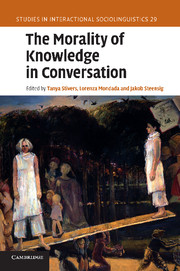Book contents
- Frontmatter
- Contents
- Contributors
- Preface
- Acknowledgements
- List of transcription and glossing symbols
- Part I Introduction
- Part II Affiliational consequences of managing epistemic asymmetries
- Part III Epistemic resources for managing affi liation and alignment
- 7 Territories of knowledge, territories of experience: empathic moments in interaction
- 8 The terms of not knowing
- 9 Proposing shared knowledge as a means of pursuing agreement
- 10 Ways of agreeing with negative stance taking
- 11 Epistemics and embodiment in the interactions of very young children
- Part IV Toward a framework
- References
- Index
8 - The terms of not knowing
Published online by Cambridge University Press: 05 November 2011
- Frontmatter
- Contents
- Contributors
- Preface
- Acknowledgements
- List of transcription and glossing symbols
- Part I Introduction
- Part II Affiliational consequences of managing epistemic asymmetries
- Part III Epistemic resources for managing affi liation and alignment
- 7 Territories of knowledge, territories of experience: empathic moments in interaction
- 8 The terms of not knowing
- 9 Proposing shared knowledge as a means of pursuing agreement
- 10 Ways of agreeing with negative stance taking
- 11 Epistemics and embodiment in the interactions of very young children
- Part IV Toward a framework
- References
- Index
Summary
Introduction
There is a disparity between expressing what we know and what we don't know in interaction. Participants regularly convey what they know implicitly by stating, telling, assessing, etc. In contrast, what they don't know is typically claimed outright. However, there are sequential environments in conversation where knowledge displays are relevant. For example, the recipient of a question that asks for information is accountable for displaying knowledge. The asker of the question, by virtue of having asked this particular recipient, presupposes that she knows and can answer. Although the recipient has several resources to deal with this, simply saying “I don't know” is a highly sensitive act and has social consequences. Relying on Estonian interaction, this chapter will look at claims of “no knowledge” (mai tea, the counterpart of English I don't know), showing parallels in Swedish, Russian and English.
Issues of how speakers manage claims of knowledge across turns have been raised in a number of interactional studies (Beach and Metzger 1997; Goodwin 1979; Heritage 1984a; Heritage and Raymond 2005; Keevallik 2008; Labov and Fanshel 1977; Stivers 2005a). Some of them also specifically deal with lack of, or lesser, knowledge. For example, claiming secondary knowledge about something has been shown to function as a “fishing” device for the recipient to provide primary knowledge about the matter (Pomerantz 1980). Claiming forgetfulness can be a means of encouraging another knowing speaker to participate in the conversation (Goodwin 1987).
- Type
- Chapter
- Information
- The Morality of Knowledge in Conversation , pp. 184 - 206Publisher: Cambridge University PressPrint publication year: 2011
- 53
- Cited by

